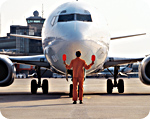
Studies show many over-worked airline pilots are not safe to fly
Saturday, March 02, 2013 by: David Gutierrez, staff writer
Tags: airline pilots, work stress, safety
- Newly released JFK files reveal Pentagon's role in creating Lyme disease and covid in the same lab
- Ginseng's hidden anti-aging power: How compound K is rewriting the rules of skincare
- “Endgame: The Hidden Agenda 21” unveils a world of conspiracy and control
- L.A.'s rebuilding nightmare: Only 4 permits issued after fire destroys 6,000 homes
- Scientists demand FDA withdraw mRNA COVID vaccines amid contamination and gene therapy concerns
- Senate Democrats deny censorship industrial complex existed, defend government's role in silencing dissent
- Dr. Suzanne Humphries makes bombshell appearance on Joe Rogan podcast, exposing vaccine industry deception back to POLIOMYELITIS
- “The shame of Minnesota”: Somali immigrants behind $250 million child nutrition fraud in largest COVID-era scam
- Former Congresswoman exposes CCP's deep infiltration of California through universities, ports, and fentanyl
- PROCESSED TABLE SALT in foods found to fuel depression
- Despite surge in MMR vaccination in Texas, measles outbreaks continue: Is VACCINE SHEDDING fueling the spread?
- “Independent” anti-Russia outlet MEDUZA faces COLLAPSE as US funding dries up
- Here are TEN all-natural ways to protect your garden without using harmful chemicals
- BPA: The hidden hormone disruptor sabotaging your health - and how to fight back
- Chewing gum's dirty secret: How your daily habit could be flooding your body with microplastics
- The hidden battle in your glass: How A1 and A2 milk could shape your health
- Catastrophic 7.7 earthquake devastates Myanmar and Thailand; death toll could reach 100,000
- Nomi Prins reveals how central bankers reshaped the global economy in “Collusion”
- Newly released JFK files reveal Pentagon's role in creating Lyme disease and covid in the same lab
- Analysis: The coming economic collapse, a mass uprising and Trump's three secret weapons to halt the growing revolt
- Festive flavors: The sweet history, nutritional profile and health benefits of pecan pie
- Elon Musk: Aliens could be here on Earth RIGHT NOW
- Trump reverses course on Gaza plan, says “nobody is expelling Palestinians”
- Big Pharma's $8 Billion bribery scheme exposed: how doctors are pushed to prescribe junk science, not heal
- Boys are back in town: Trump’s patriotic alpha crew takes the wheel while toxic females ride in the backseat
- Reclaim your health: How midlife exercise reverses years of inactivity
- A lack of integrity in Academia: Harvard professor found GUILTY of fraudulent research to promote CRT theory
- Survival 101: Effective EMF blocking techniques
- EPA advisor admits the agency is funneling billions to climate groups ahead of Trump’s return to White House
- Dr. Mike Yeadon releases 15-minute testimony - WATCH - about genocidal intent of COVID “vaccines”
- 5 Simple steps to boost your brainpower: How to strengthen executive function in a distracted world
- Florida takes a stand: DeSantis proposes permanent ban on mRNA vaccine mandates
- Sugarcane extract superior to cholesterol-lowering drugs?
- Mike Adams Sermon 66: God will DESTROY ISRAEL for its wickedness
- Pilots report mysterious lights 'moving at extreme speeds' across Oregon skies
- Space war brewing? Russia threatens to destroy Starlink satellites
- EPA advisor admits the agency is funneling billions to climate groups ahead of Trump’s return to White House
- California's social media censorship law struck down: A victory for free speech or a threat to online safety?
- The Health Ranger releases “Vaccine Zombie” song and music video, using AI-animated zombies for the music video
- Dr. Mike Yeadon releases 15-minute testimony - WATCH - about genocidal intent of COVID “vaccines”
- The pandemic as a tool for INDOCTRINATION: Understanding “The Indoctrinated Brain” by Dr. Michael Nehls
- Newly released JFK files reveal Pentagon's role in creating Lyme disease and covid in the same lab
- Florida takes a stand: DeSantis proposes permanent ban on mRNA vaccine mandates
- Mike Adams releases country western hit single: Goin’ Back in Time is Comin’ Home
- Mike Adams releases music poetry sensation: A Child of God
- “Why we influenced the 2020 elections”: Facebook files reveal the coordinated effort to bury the Hunter Biden laptop story
- Unpacking the Lies That We’ve Been Fed – new song and music video released by Mike Adams, the Health Ranger
- RFK Jr. clears key hurdle: Sen. Susan Collins backs controversial HHS nominee, signaling a new era for health policy
- Mike Adams releases new song and music video: Nothing More Disgusting Than a Globalist
- Michigan sheriff announces criminal investigation into 2020 election crimes, Dominion Voting Systems
- Israeli soldiers accused of even more torture and abuse in the West Bank
- Migrants are taking advantage of recent hurricanes to scam residents and loot their homes
- House Intelligence Committee calls for the ARREST and PROSECUTION of Dr. Anthony Fauci
- Rep. Nancy Mace introduces bill to ban biological males from female facilities on federal property
- Red Cross issues warning to stop blood plasma donations from vaccinated people
- Scientists confirm: GENIUS brain function can be spontaneously unleashed in humans without any apparent cause
- EPA advisor admits the agency is funneling billions to climate groups ahead of Trump’s return to White House
- HYSSOP: What research reveals about the health benefits of this ancient holy herb
- Two containers with completed ballots fall out of truck in Florida
- Fully vaccinated about to see “tsunami” of illness and death, warns virologist
- Global leaders unite to clamp down on “misinformation” with UN-backed Cascais Declaration
- BREAKING: 2025 NDAA authorizes mandatory military draft of WOMEN across America… as Pentagon pursues global NUCLEAR war with both Russia and China at the same time
- Michael Yon warns of a ZIONIST TAKEOVER in Trump’s second administration
- BOMBSHELL: DNA testing kits are a SCAM to develop ethnic-specific bioweapons
- Ozempic and Wegovy weight loss drugs are injectable LIZARD VENOM PEPTIDES that may unleash a devastating wave of organ failure… side effects align with symptoms of SNAKE BITES
- Israeli soldiers accused of even more torture and abuse in the West Bank
- These 13 countries just signed an agreement to engineer a global FAMINE by destroying food supply
- NASA admits that climate change occurs because of changes in Earth’s solar orbit, and NOT because of SUVs and fossil fuels
- RFK Jr. clears key hurdle: Sen. Susan Collins backs controversial HHS nominee, signaling a new era for health policy
- Sermon 30: How Jesus reveals Caesar’s FAKE CURRENCY and FALSE AUTHORITY
- Coriander seeds: Ancient medicine backed by modern science
- Arizona officials claim Maricopa County needs 10-13 days to tabulate results of the election
"Regulations made without reference to scientific knowledge or social context are dangerous," Bennett said. "EASA's proposed FTLs take little account of the latest sleep research and no account of the pilot lifestyle as described in my own research. Passenger safety is threatened."
The main problem, Bennett notes, is that the proposed FTLs regulate only the amount of time that a pilot may spend flying, disregarding other factors that may influence pilot exhaustion. For example, Bennett's surveys of pilots have shown that nearly 50 percent have a commute of more than an hour, yet FTLs disregard the effect that this extra travel time has on pilot fatigue.
"FTLs take no account of the pilot lifestyle," Bennett said. "No account is taken of prior wakefulness, the duration and quality of sleep or commuting. FTLs are dissociated from the realities of life -- despite the fact that those realities affect performance."
More than 20 percent of all pilots that Bennett surveyed said that they had been awake for 28 or more hours at the end of a single shift.
"Research proves that judgment is seriously impaired after 18 hours of wakefulness," Bennett said. "How well do you think you could drive after being awake for 18 hours?
Disrupted Sleep Cycles
In a 2012 study published in Current Directions in Psychological Science, psychologist John A Caldwell of fatigue assessment firm Fatigue Science analyzed the different factors that contribute to pilot fatigue. In addition to simple lack of sleep, Caldwell notes that the interruption of pilots' natural sleep-wake cycles also contributes to dangerous sleepiness and fatigue. Yet these cycles are regularly disrupted during day-to-day pilot work by factors such as long shifts, nighttime flights, and the crossing of multiple time zones in a short period."Fatigue-related risks increase substantially when (a) the waking period is longer than 16 hours, (b) the preduty sleep period is shorter than 6 hours, or (c) the work period occurs during the pilot's usual sleep hours," Caldwell wrote.
The focus on FTLs "seems to be a function of convenience rather than science," he wrote. To truly correct the problem of dangerous pilot fatigue, airlines need to implement science-based measures such as educating crew members on sleep hygiene, allowing onboard cockpit napping, and the use of sleep-tracking technologies.
"As a society, we must come to grips with the fact that the average adult needs 7-9 hours of sleep every single day," Caldwell said. "And there is no amount of willpower, professionalism, training, or money that will prevent the performance losses associated with the failure to routinely acquire sufficient sleep."
Sources for this article include:http://www.sciencedaily.com/releases/2013/01/130103073242.htm ; http://www.sciencedaily.com/releases/2012/04/120424162336.htm
Airline pilots at FETCH.news
Get independent news alerts on natural cures, food lab tests, cannabis medicine, science, robotics, drones, privacy and more.
Take Action: Support Natural News by linking to this article from your website
Permalink to this article:
Embed article link: (copy HTML code below):
Reprinting this article:
Non-commercial use OK, cite NaturalNews.com with clickable link.
Follow Natural News on Facebook, Twitter, Google Plus, and Pinterest
Science News & Studies
Medicine News and Information
Food News & Studies
Health News & Studies
Herbs News & Information
Pollution News & Studies
Cancer News & Studies
Climate News & Studies
Survival News & Information
Gear News & Information
News covering technology, stocks, hackers, and more



"Big Tech and mainstream media are constantly trying to silence the independent voices that dare to bring you the truth about toxic food ingredients, dangerous medications and the failed, fraudulent science of the profit-driven medical establishment.
Email is one of the best ways to make sure you stay informed, without the censorship of the tech giants (Google, Apple, Facebook, Twitter, YouTube, etc.). Stay informed and you'll even likely learn information that may help save your own life."
–The Health Ranger, Mike Adams













































